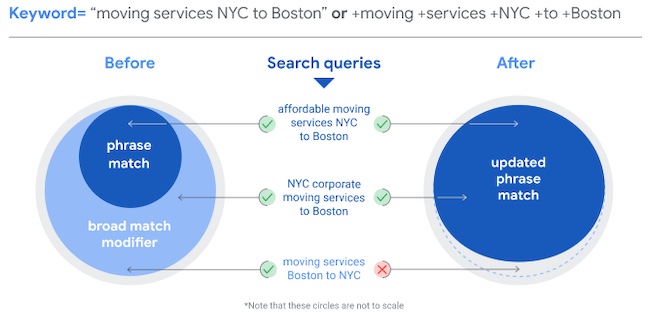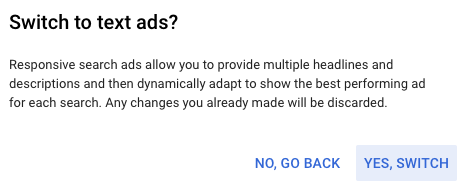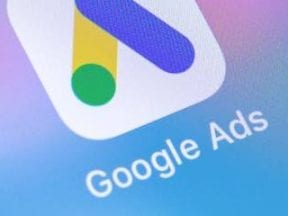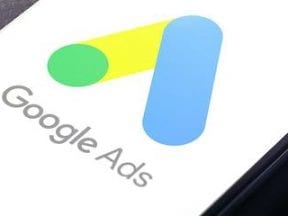Google has recently announced three changes that will force advertisers to rethink how they set up campaigns. The changes are:
- Broad match modifier moving to phrase match,
- Responsive search ads becoming the default ad type for Search campaigns,
- The decision to not create alternative tracking identifiers once third-party cookies are phased out.
None of the changes are shocking. Over the last few years, Google has allowed more query variants to show for its match types. An ad could show if Google deems a query is related to the ad’s keyword.
Responsive search ads allow Google to determine automatically which combinations of copy work best.
And user tracking, data collection, and privacy are increasingly important to Google.
In this post, I’ll review each of these changes.
Phrase Match
Though “phrase” has always been a match type, it has been mostly unnecessary since the advent of “modified broad” match. Phrase match tells Google that the word order must remain constant but additional terms can come before or after.
For example, the phrase match of “oval coffee tables” can show for queries such as “large oval coffee tables” and “oval coffee tables for sale.” But the query has to be in the correct word order.
“Modified broad” match tells Google that the order doesn’t matter as long as each word is in the query (designated by a plus sign in front of the word). By bidding on the modified broad match version of “+oval +coffee +tables,” an ad may show for “coffee tables that are oval” or “oval and round coffee tables.”
The new phrase match will adhere to word order when necessary to the meaning but will allow for broader queries. Here’s a visual from Google showing before and after updates.

The new phrase match will adhere to word order when necessary to the meaning but will allow for broader queries. Image: Google.
Advertisers with modified broad match will eventually need to switch to phrase match. Google has stated that the switch has already started. Come July 2021, modified broad match keywords won’t be a keyword match type option, but existing modified broad match keywords can remain.
Moving forward, use phrase match for keywords added as modified broad match, but there is no need to migrate existing modified broad match keywords to phrase.
Responsive Search Ads
Google is encouraging advertisers to adopt automated bidding and responsive search ads. RSAs let advertisers submit up to 15 unique headlines and four description lines. Google will then show the best combinations based on the highest click rates.
Expanded text ads are similar, with three headlines and two description lines.
Expanded text ads are still an option, but Google makes it harder to choose. When creating new ads, RSAs are the only ad type choice, although an advertiser can switch back to text ads. An advertiser can still create expanded text ads in Google Ads Editor.

Advertisers can still create expanded text ads in Google Ads Editor.
I’ve anticipated Google’s move to RSAs as the default ad type. It is not a concern. Advertisers have generally seen better click-through-rates with RSAs, benefitting from Google’s internal signals.
Additionally, advertisers can pin messaging to headlines. For example, a call-to-action can remain attached to headline 2 if it’s always been that way. No action is required since expanded text ads can continue to run. If RSAs become the only ad type, Google will almost surely give advertisers the tools to make the transition.
Privacy Concerns
David Temkin is Google’s director of product management, ad privacy, and user trust. He wrote, “If digital advertising doesn’t evolve to address the growing concerns people have about their privacy and how their personal identity is being used, we risk the future of the free and open web.”
To that end, Google will not track individuals once it phases out third-party cookies.
Advertisers will need to reassess how they target audiences. Google currently provides interest-based audience targeting, which expands advertisers’ reach. However, the use of data will change once cookies are phased out. Google created Privacy Sandbox to address this concern.
One of the potential solutions is Google’s own Federated Learning of Cohorts. It aggregates groups of people with similar interests. The idea is not to collect individual data but rather to crowdsource through devices.
Google will still allow first-party data targeting, such as customer match and retargeting. Targeting across Google properties such as YouTube and Gmail remains the same. Conversion tracking will still be in place, and advertisers can still gauge performance.
But, overall, Google’s advertising platforms will reflect its focus on privacy.




